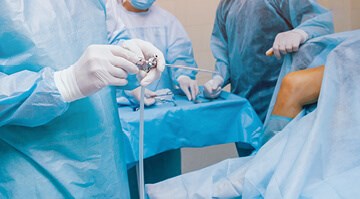There are more options available today to get quality health care at a lower cost. If you need outpatient surgery, an Ambulatory Surgery Center (ASC) may be an option to consider.
Today, surgical procedures may be done in a choice of settings. Many factors come into play when choosing which option is best. It depends on the type of surgery, the patient's condition and more.
What is an Ambulatory Surgery Center (ASC)?
Ambulatory surgery centers (ASCs), are licensed, freestanding outpatient clinics. They are often doctor-owned and may specialize in certain procedures. They are most often smaller than hospitals.
The number of ASCs has increased, and more surgeries are being done at these centers. Advances in anesthesia, technology and demand for lower-cost and higher quality care are factors in this rise. More patients now have a choice of surgical settings1.
Not every outpatient surgery may be performed at an ASC, but most can take place there or in a hospital. Some of those procedures are:
- Arthroscopy
- Breast biopsy
- Wound excision/debridement
- Cataract surgery
- Circumcision
- Dental restoration
- Gastric bypass
Not all cases are right for an ASC setting. Hospitals have more resources to manage problems. ASCs do not have support departments like MRI suites and ICUs. The procedure, staff involved and patient’s health all affect the decision.
Advantages of ASCs
Hospitals are often better suited for higher risk cases, but research has shown that ASCs have many advantages.
- Lower costs—This is due to lower overhead, fixed costs and the fact that patients do not stay overnight.
- ASCs often cost 45-60% less than a hospital setting.
- On average, QualChoice members save about $400 in out-of-pocket costs on surgeries done at an ASC.
- Better performance—If you’re in good health, experts say, an ASC procedure may work for you. One study showed that ASC performance is often better than that of a hospital setting. It also showed that the quality of surgery is equal to if not better than at a hospital.3 Here are some other points:
- ASCs have better control over scheduling, fewer delays and less frequent rescheduling.
- They have been shown to perform more efficiently than hospitals.
- They have lower infection rates on average than hospitals.2
Choosing the best setting depends on each patient’s case and health condition. There are benefits and drawbacks to both settings. But studies have shown similar positive patient outcomes at both.3
For patients who are candidates for outpatient surgery, ASCs may offer a higher quality, lower-cost option to hospitals. If you are being scheduled for an outpatient surgery, ask your doctor if an ASC is an option for you.
References
1 http://anesthesiology.pubs.asahq.org/article.aspx?articleid=1918045
2 https://www.beckershospitalreview.com/quality/ssi-rates-hospitals-vs-ascs-2010.html
3 https://www.sciencedirect.com/science/article/pii/S0194599809014788






